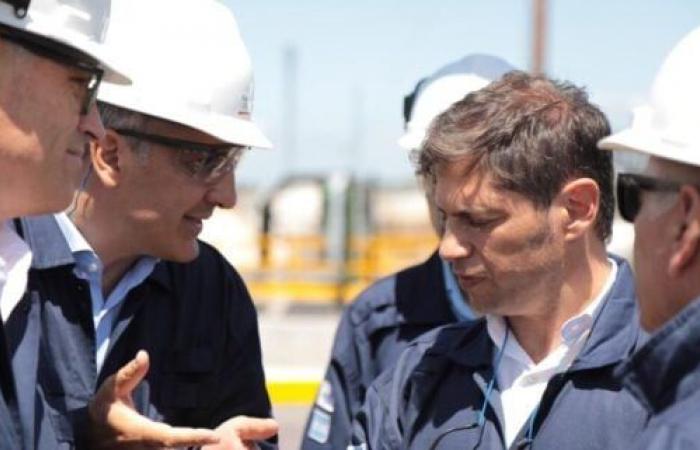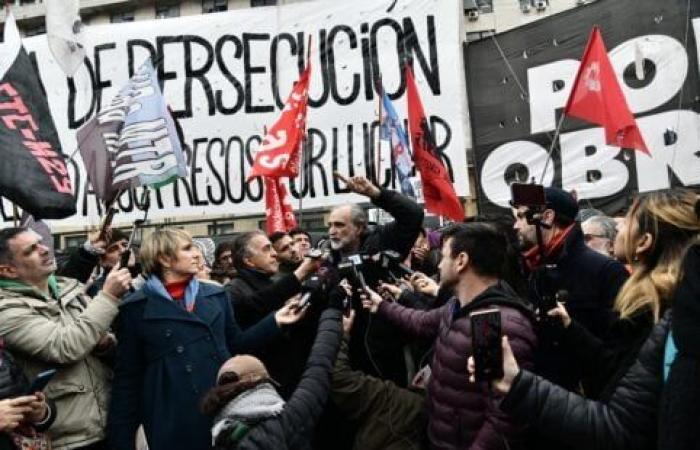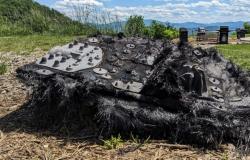The installation by YPF and the Malaysian oil company Petronas of a Liquefied Natural Gas (LNG) plant that would serve to transform the gas extracted from Vaca Muerta into an exportable material has become a factor of national political controversy. The investment could amount to 40-50 billion dollars in stages until 2031, and is expected to generate exports of more than 30 billion dollars a year as soon as the work is completed and the plant begins to operate.
The sanction of the Bases Law, which would be confirmed this Thursday, changed the scenario on which the project was previously based. The Large Investment Incentive Regime (Rigi) establishes additional benefits for the installation of this type of extractive industries. According to Página/12, the plant would create 6,500 direct and indirect jobs during its construction, and 3,000 during the operating period.
The labor reform established in the Base Law, with precariousness, dismissals at the discretion of the employers and the impossibility of complaining or organizing against abuses would also imply “better conditions” for investors in that sense. Therefore, while waiting for better benefits for the capitalist class, the start of the project has not yet materialized and the province that will host it is under discussion, in a dispute between Buenos Aires (Bahía Blanca) and Río Negro (Punta Colorada).
Regarding the oil, gas and hydrocarbon industry, it must be recognized that the idea of establishing special “incentive” regimes for large investments is not at all original: Alberto Fernández had already promoted a project to promote LNG to the measure of the Petronas company, with tax reductions (VAT, profits, exemptions and “fiscal stability”), availability of foreign currency to transfer abroad, reduction of export right rates, among others; Previously, Cristina Kirchner and Kicillof had their own Rigi, when they signed a secret agreement that established exceptional advantages for the American Chevron to exploit Vaca Muerta.
The dispute over the business and the project headquarters
The Rigi chapter in the Senate was approved with 38 votes in favor (including three senators from UxP) and 32 against, showing the transversal support for the business scheme demanded by big capital. Once endorsed by the Deputies, the dispute will be transferred to the provinces that must give their support to the regime.
Since the beginning of the project, the city of Bahía Blanca was presented by some media and interested officials as the “natural recipient” of these investments, given that it has a deep port, good urban accessibility, prior industrial development, human resources and some legal conditions that companies require. To this end, the province reported that it had already “reserved” 1,500 hectares on the coast of the estuary for the installation of the plants, although without an environmental impact study in a delicate ecosystem already in crisis due to current port and industrial activity. The latter is important, since according to the magazine Environmental Research Health, the consequences of the pollutants emitted from LNG terminals in the United States are respiratory illnesses and deaths.
In recent weeks, the governor of Río Negro, Weretilneck, began to negotiate that the headquarters of the investment be Punta Colorada, in his province, in exchange for support for the Bases Law and particularly the Rigi, which the Buenos Aires ruling party did not support. in Congress. If completed in said province, the LNG plant would be added to the “Vaca Muerta Sur” pipeline, whose construction has already begun and which will have its export terminal precisely in Punta Colorada. In this context, the national government, and particularly the head of YPF Horacio Marín, began to pressure Kicillof so that Buenos Aires joins the Rigi, under the extortion of sending the project to where it is most profitable for investors.
The mega-investment stipulated by this project is already generating clashes and realignments of all kinds within the bourgeois parties. Governor Kicillof once again said that he already gave his “negative position with respect to the (Rigi) regime,” although he clarified that his refusal is not “with respect to an investment promotion regime in general, but against this form that has been already given this proposal.” He then kicked the issue forward by saying that the provincial legislature could not yet discuss accession to the Rigi because “it has not yet been voted on.”
Whether or not the province of Buenos Aires adheres to the Rigi de Milei remains to be seen, especially considering that behind the problem there are big businesses at stake. For now, both Peronism and the entire capitalist blocs of the Buenos Aires legislature (with the exception of the official bloc that responds to Milei) spoke in favor of the port of Bahía Blanca as a headquarters for investment. We are talking about the ruling party (Unión por la Patria), the UCR blocks, the Civic Coalition, both PRO blocks (macristas and bullrichistas) and even some libertarian blocks that broke away from the La Libertad Avanza block. In the case of PRO-Libertad (the one that responds to Patricia Bullrich), it has already taken care of proposing a “plan B” to Kicillof, by presenting a bill for a special “Rigi” for Liquefied Natural Gas in the province of Buenos Aires, which can guarantee benefits to companies if they do not adhere to the national Rigi.
For Buenos Aires Peronism, the issue can generate important crises, which add to the already known tensions between Kicillof, La Cámpora and other sectors such as massismo. For now, the leaders of Peronism in the project area, such as Susbielles, the mayor of Bahía Blanca, insist on the official line of the province: that the national government guarantee the project where it was going to be in its beginnings.
The president of the provincial Chamber of Deputies, Dichiara, who is also from the area, when consulted about the matter, replied, asking himself “What happens if we adhere to the Rigi and finally the project is carried out in Punta Colorada?”, almost as a demand for guarantees. . Finally, the political positions in the current political regime depend on the businesses that are defended, and for the Kicillof government it would be very problematic to lose a business of this type in a province with an economic and debt crisis just for defending an opposition story, more even though it is the same governor who, as Minister of National Economy, established similar regimes.
A working class program
Beyond “nuances”, the national, provincial and municipal governments have the same social orientation for the problem of gas, oil and hydrocarbon exploitation. Both Milei and the governors Kicillof, Weretilneck, radicalism, the PRO and company agree to carry out this extractivist negotiation, which will mainly benefit large corporations that decide to invest. What is at stake in what is presented as the dispute over the location of the project is, finally, who grants better conditions for the beneficiaries, who will not be the Argentine workers.
Let us add to this that the project seeks to export the gas produced in Vaca Muerta, where the fracking method prevails, which consumes enormous amounts of water and entails seismic risks. The project as it is known implies a deepening of a scheme of looting and extractivism in our country, detached from industrial and economic development outside of primarization.
In opposition to the Rigi, which enables capitalist plundering of natural resources and the wealth generated by workers, and to the provincial lobbies, which dispute the installation of the LNG plant in their respective provinces by offering more and greater concessions to investors, We defend the comprehensive nationalization of the energy industry under the control of workers and environmental organizations.
We alert the working population of the province of Buenos Aires and Río Negro that, in view of the installation of the LNG plant, it will be necessary to organize worker and neighborhood control, so that the installation does not have a negative environmental impact, to that there is entry to jobs in a transparent manner and that they are under agreement and with full labor and union organization rights, and finally so that the resources generated are at the service of the social needs and industrial development of the country. .
International act: down with the governments of war and hunger
Wednesday the 26th, 6pm at the Faculty of Social Sciences of the UBA, with organizations from nine countries. –
The Belliboni investigation and the right of workers to fight and organize politically
His investigative statement in Comodoro Py was a class defense against the political persecution of the State. –







